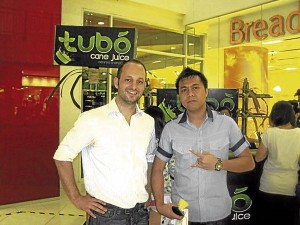Austrian works on putting sugarcane juice on Pinoy’s tables

CHRISTOPH Schiessl established Tubo Cane Juice Inc. after discovering the potential of “tubo” as an alternative to soft drinks.
Cebu City, Philippines—His love for the Philippines and its unique resources convinced Christoph Schiessl that there is a product worthy to be developed that would make Filipinos prouder.
In his travels around the country, he found the product in the unassuming “tubo” (sugarcane), a grass grown in tropical countries like the Philippines and has long been relegated as a raw material in the making of sugar.
He set up Tubo Cane Juice Inc. in November 2010 with Filipino partners, believing in the marketability of tubo cane juice as nature’s energy drink.
With a kiosk in Gaisano Country Mall in Barangay (village) Banilad, Cebu City, and another outlet inside Sacred Heart School-Jesuits in Mandaue City, Christoph, born in Austria, says the company is on its way to spreading the word that there is more to sugarcane’s sweet and grassy taste.
<strong>Discovery</strong>
“Filipinos have stories to tell with the tubo. This product reminds them of their childhood,” he tells the Inquirer.
Christoph, now a permanent resident of Cebu, has been drinking tubo cane juice for the last 10 years. It was his travels in different countries that introduced him to the drink.
“Tubo cane juice is a street drink. Every time I go to Asian countries, I look for it. I like the product but I did not find it in the Philippines,” he shares.
Christoph says the drink is known in Vietnam, Thailand, Indonesia, Hong Kong, Singapore, India, China and Iran. It is also popular in Brazil, Egypt and Kenya, he notes.
He says tubo juice was only sold in Manila’s Chinatown, where it was considered to have medicinal benefits. The juice was visible in Manila malls in 2006 but it was nowhere to be found in Cebu.
This inspired him to set up a business in Cebu.
Born in Austria, Christoph first came to Cebu in 1999 to visit his family members. His grandfather was the one who set up Vienna Kaffeehaus in Cebu in 1983 (which was sold to the Basubas family in 2008).
He took a business course in Cebu but he went back to Austria in 2003 to complete a degree in outdoor training and adventure therapy. He came back in 2007 and lived in the city since then.
The diving instructor and part-time German teacher says the goal is to open four Tubo Cane Juice outlets in 2011 with the aim of making their presence felt inside malls.
Tubo cane juice is extracted using a machine. The juice is then mixed with fruits to create a refreshing drink.
Apart from the fresh tubo juice, Christoph says they came up with six more flavors: tubo-mansi (kalamansi), tubo-piña, tubo-orange, tubo-mint, tubo-milky pearl (sago) and tubo-strawberry.
Drinks range from small, medium and large sizes sold between P35 and P65 each.
Since its launching last year, Christoph says they have received positive feedback from people who have tried the drink.
He says the juice can be consumed by people with light diabetes since its low glycemic index does not raise the blood sugar level in the same way refined sugar does.
Citing several studies, Christoph says sugarcane juice is known to be rich in vitamins and minerals such as phosphorous, calcium, iron, magnesium and potassium and energizes the body because of its high quantity of useful carbohydrates.
He says sugarcane juice is the best substitute to any soft drink products.
Hearing colorful stories about the Filipinos’ love affair with the tubo is always a refreshing treat to Christoph, who also speaks Cebuano and considers himself a Cebuano by heart and by choice.
“Filipinos, at some point in their lives, have tried chewing on ripe sugarcane,” he says.
Christoph says he is grateful to local suppliers (mostly from towns in northern Cebu) who have supported him in this business venture even if he is not a major market player.
This promising business opportunity is also an avenue for Christoph to re-educate the Filipino youth about the importance of sugarcane.
“In the research of sugarcane around the world, Cebu is one of the most important (areas) when it comes to new sugarcane variations,” he notes.
